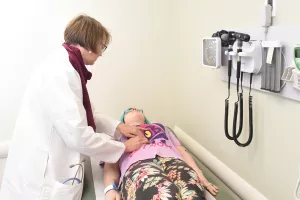Stomach cancer, also known as gastric cancer, is a disease that usually begins in the tissues that line the stomach and can spread to other parts of the body.
Compassion is at the core of our care
The stomach is even more powerful and important than you might realize. Not only is the stomach responsible for breaking down food and absorbing nutrients, but it also releases hormones that let you know you're hungry and regulate other organs like the gallbladder.
Stomach cancer can throw off your body's functional harmony. But when you're under our care, our brightest minds in medicine will work together to nourish you — nutritionally, physically and emotionally.

Conditions
People living with stomach cancer don't often show symptoms early on. When symptoms appear, they may be mistaken for other, less serious stomach problems like gas or an ulcer.
If you're experiencing the following symptoms, talk to your doctor or gastroenterologist as soon as you can:
Testing
While we tailor each stomach cancer treatment path to a person's unique needs, everyone's care begins with an evaluation.
Your care team will order a combination of these tests to understand your condition better:
- Blood tests
- Endoscopy
- Imaging studies
- Physical exam
Once we've confirmed that you're living with stomach cancer, it's important to understand if the cancer has spread and, if so, how far. This process is called staging, and it helps us design a care plan that offers you the greatest chance of success.
Staging techniques for stomach cancer include:
- CT scan
- Endoscopic ultrasound
- Laparoscopy (a minimally invasive surgical procedure)
- Positron emission tomography (PET)
Treatments
Living with stomach cancer is complex. But understanding your treatment plan doesn't need to be.
We'll chart a treatment path based on the stage of your stomach cancer, whether the cancerous cells have spread to other parts of the body, and above all, what you're comfortable with.
The most common approaches for treating stomach cancer are surgery, chemotherapy and radiation therapy.
Surgery
Surgery is the most common treatment choice for stomach cancer.
Partial (subtotal) gastrectomy
In a partial gastrectomy, only a portion of the stomach is removed. If the tumor has spread to other tissues or organs like the liver, pancreas, small intestine or spleen, we can remove the affected areas.
Total gastrectomy
A total gastrectomy removes several body parts, including:
- The entire stomach
- Lower part of the esophagus
- Part of the small intestine (duodenum)
- Surrounding lymph nodes
During the surgery, we'll connect the remaining part of the esophagus to the small intestine, allowing you to eat like you did before.
Chemotherapy
Your care team may recommend chemotherapy as a treatment on its own or in combination with other procedures. Chemotherapy drugs are usually given orally to target abnormal cells throughout the body.
Additionally, your doctor may recommend chemotherapy before surgery to shrink a tumor or, following surgery, to help destroy any remaining cancer cells.
Radiation therapy
Radiation therapy and chemotherapy are often used as a dynamic treatment duo designed to shrink and destroy tumors. High-energy radiation is directed at the tumor area to eliminate harmful cells while protecting healthy ones.

From regular office visits to inpatient stays, find the healthcare you need and deserve close to home.

Meet the doctors and care team devoted to supporting you every step of the way along your path to better health.